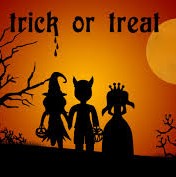Archive for October, 2014

Cops urge vigilance as kids ‘trick or treat’
 (CNS):The police will be taking to the streets on Friday for some high visibility patrolling, not to keep the ghost, ghouls, duppies and other spooks away but to ensure families are safe from the regular criminal contingent and to assist with road safety. But hot on the heels of warnings from the Department of Environmental Health about the dangers of cakes and candies to kids, the police are urging parents and guardians to ensure their kids are trick or treating safely. Children should not enter a stranger’s home unless they are with a parent or trusted adult, police said, and also pointed to road safety tips.
(CNS):The police will be taking to the streets on Friday for some high visibility patrolling, not to keep the ghost, ghouls, duppies and other spooks away but to ensure families are safe from the regular criminal contingent and to assist with road safety. But hot on the heels of warnings from the Department of Environmental Health about the dangers of cakes and candies to kids, the police are urging parents and guardians to ensure their kids are trick or treating safely. Children should not enter a stranger’s home unless they are with a parent or trusted adult, police said, and also pointed to road safety tips.
If a child’s costume does not have reflective strips, police are advising parents to attach glow sticks to it or have the child carry a flashlight. Kids should not wear masks that restrict their sight and everyone out and about should walk towards oncoming traffic. The public is asked not to place candles or open flames in walkways or areas where they may come in contact with costumes and motorists are being asked to drive slowly and be on the lookout for anyone crossing the street.

$3k reward offered after phone top-up thefts
 (CNS): Following half a dozen incidents at the beginning of this year in connection with damage to and theft of mobile phone top-up machines from various locations across the islands, the local branch of Crime Stoppers is upping the usual $1,000 reward to $3,000 for information that leads to a conviction. Cayman Crime Stoppers said it is urging people to call with information concerning top-up machines stolen or damaged over the first three months of the year at 1203 North Side Road, Pirates Cove Bar Seaview Road, and Lorna’s Texaco at 140 Bodden Town Road, Welly’s Cool Spot and Reflections on Sound Way, as well as George Town.
(CNS): Following half a dozen incidents at the beginning of this year in connection with damage to and theft of mobile phone top-up machines from various locations across the islands, the local branch of Crime Stoppers is upping the usual $1,000 reward to $3,000 for information that leads to a conviction. Cayman Crime Stoppers said it is urging people to call with information concerning top-up machines stolen or damaged over the first three months of the year at 1203 North Side Road, Pirates Cove Bar Seaview Road, and Lorna’s Texaco at 140 Bodden Town Road, Welly’s Cool Spot and Reflections on Sound Way, as well as George Town.
Cayman Crime Stoppers Chairman, Malcolm Ellis, urged members of the public to call the tip line, adding that the NGO which funds the anonymous tip line is able to offer an increased reward for a break that leads to catching the culprits in this case.
Anyone who calls with information is given a unique code which they can use to make a claim and do not have to disclose their identity. The Cayman Crime Stoppers tips line is 800-TIPS (that is, 800 8477) and is a free, local call. Tips may also be submitted anonymously through the Crime Stoppers website at www.crimestoppers.ky
Cayman Crime Stoppers is a non-profit civilian run organization formed 21 years ago by the Cayman Islands Chamber of Commerce. Working in partnership with the Royal Cayman Islands Police Service (RCIPS), the community and the media, it has become one of the most effective crime solving tools available to local law enforcement agencies. Cayman Crime Stoppers provides a safe and secure means for anybody with information about a crime to share it freely whilst protecting their identity. It could also earn them a reward of up to $1,000. Calls to the Cayman Crime Stoppers anonymous call-centre are handled in Miami, Florida.

Brac women face indirect discrimination
(CNS): As government awaits a decision from the UK regarding the extension of the Convention on the Elimination of All Forms of Discrimination against Women to the Cayman Islands, a report from the Sister Islands highlights lingering inequalities. Based on a meeting held in the Brac in June, the report found many common problems in the Sister Islands as those on Grand Cayman, indicating indirect, but worrying, discrimination against women. The report also revealed some specific issues on the smaller island that could fall foul of Article 6 of CEDAW concerning the trafficking of women.
The supplementary report to the National Conference on Women Report, organised bythe gender affairs ministry and published in May, was released this week and contains a snapshot of the issues faced by many woman on Cayman Brac and Little Cayman.
In particular, in reference to article six, which requires the suppression of female trafficking and exploitation of sex workers, a troubling trend was identified on the Brac of bar managers which could be interpreted as trafficking.
The meeting documented reports that bar owners were employing women on temporary work permits and intentionally having large turnover rates to prevent these young woman from getting into steady relationships and undermine their ability to attract and entice male customers. They were said to be manipulating the system and using women as sexual bait to lure male customers.
The high turnover of single, pretty female staff, who in bar promotions are scantily clad, reinforced the idea that women were being brought to the Brac in significant numbers to attract men to the bar with the suggestion that the women were ‘available’.
The law facilitates the acquisition of temporary permits and short employment periods. Managers don’t have to pay these female workers pensions, as the law says a worker can be employed for nine months before the emplyer needs to pay pension, and because the women are employed for short stints, most don’t take out health cover either, as the women are usually gone before the employers are caught.
Not only were these alleged practices seen as exploitation, the women are economic migrants and come to Cayman to work for money and fear reporting their employer and losing earning opportunities completely.
Violence against women was also a real concern and the police attitudes towards domestic violence were criticised, as well as the cultural acceptability among men that they have a right to hit women and still, in many cases, see the females in their lives as their property.
The report summarised some of the community-wide problems woman face. The need for much more public education and a heightened awareness of women’s rights was recognised and the need to empower women to stand up for those rights they now have in law.
But the meeting found that gender issues intersect with inequalities regarding race, class, age and national origin. The report said, “Gender issues cannot be viewed in isolation and mainstreaming a gender perspective throughout society will ensure these issues remain visible.”
Participants felt that as a society discrimination has been allowed to continue, holding back productivity, preventing social benefits and increased human development, as well as burdening government.
“Full participation of women on an equal basis with men in all areas of society will bring about positive change for the benefit of girls and women and also their families, employers, communities and society as a whole,” the report concluded.
See the report below.

Registarion still open for annual radio fun-run
 (CNS):The 8th Annual Breeze Fusion Walk/Run takes place this Saturday, 1 November and there is still time to sign up for what is becoming a mixed competitive and fun run over 5ks (3.1miles). Walkers will start off from Smith’s Cove at 6:30am, with runners setting out at 6:45am and for the first time there is also a separate children’s race. Registration is $15.00 for adults, $10.00 for students under sixteen. Competitors can sign up at radiocayman.gov.ky and caymanactive.com/breeze, and on Friday at Grand Old House 5pm until 8:00pm. The final chance to register is at 6:00am at the event.
(CNS):The 8th Annual Breeze Fusion Walk/Run takes place this Saturday, 1 November and there is still time to sign up for what is becoming a mixed competitive and fun run over 5ks (3.1miles). Walkers will start off from Smith’s Cove at 6:30am, with runners setting out at 6:45am and for the first time there is also a separate children’s race. Registration is $15.00 for adults, $10.00 for students under sixteen. Competitors can sign up at radiocayman.gov.ky and caymanactive.com/breeze, and on Friday at Grand Old House 5pm until 8:00pm. The final chance to register is at 6:00am at the event.
All participants receive an event t-shirt & goodie bag. Trophies go to the overall male & female finishers in the run, along with medals & prizes to the top competitors in each age category for both the run & walk. Random prizes will also be up for grabs.
Radio Cayman’s Deputy Director Paulette Conolly-Bailey said the stations’ signature event, said part of the proceeds go to the National Council for Voluntary Organizations (NCVO) and John Gray High School’s “Helping Hands Program”.
“Just like Radio Cayman, the Breeze Fusion Walk/Run has a special place in my heart because of what it represents to our community and the lives it touches from the funds raised,” she said. “I’m delighted that the event is growing every year and we have reached our 8 year milestone. Rain or shine it’s going to be another superb family event for our charitable causes.”
Principal of John Gray High School, Lyneth Monteith said the school was grateful to the station for selecting its programme as a recipient. “Our students face many challenges and to be able to support them in overcoming these challenges, will lead to them being able to achieve success at school, as they work to be the best that they can be,” she said.
Major sponsors include Cayman National, ROMA United Sports Club, Maedac Supply Company/WATA and Grand Old House, with numerous Associate Sponsors providing cash as well as gift certificates. Breeze Fusion is organized by Radio Cayman/Breeze FM and the Phoenix Athletic Club, assisted by Coach Jerry Harper and service club volunteers.

Dart battle continues
 (CNS): Despite recent indications by Premier Alden McLaughlin that the Dart negotiations over the provisions and concessions the developer was given under the controversial NRA Agreement were heading in the right direction, he made it clear Wednesday it was a tough and on-going battle. During a debate on amendments to the planning law, which stirred up trouble between the premier and his former colleague, Arden McLean, in the Legislative Assembly, the country’s leader said the legislative changes had nothing to do with more favours for that developer. Government was continuing to renegotiate the “difficult and troublesome elements” of the deal, he said.
(CNS): Despite recent indications by Premier Alden McLaughlin that the Dart negotiations over the provisions and concessions the developer was given under the controversial NRA Agreement were heading in the right direction, he made it clear Wednesday it was a tough and on-going battle. During a debate on amendments to the planning law, which stirred up trouble between the premier and his former colleague, Arden McLean, in the Legislative Assembly, the country’s leader said the legislative changes had nothing to do with more favours for that developer. Government was continuing to renegotiate the “difficult and troublesome elements” of the deal, he said.
The agreement withDart, the islands’ dominant investor, landowner and developer, which was signed by former premier McKeeva Bush in December 2011, has stirred up controversy since it was first announced, from the closure of the West Bay Road to the 50% concessions on all room tax from hotels that Dart will build now and in the future.
In the LA yesterday a further row erupted during the debate over the planning law amendment bill.
The member for East End accused government of making changes to facilitate big developers and continue what the UDP had started with the Dart deal, which he said was a sell-out for the country. McLean had suggested it was no coincidence that, as Dart confirmed plans to build yet another hotel on Seven Mile Beach, the planning law changes were being made that would facilitate him and other big developers but would penalise the small local landowner.
McLaughlin, however, hit back at McLean and accused him of falsely impugning his former colleagues with whom he once “broke bread” and questioning their integrity. The premier said the comments were “scandalous” and he should have tempered his contribution so as to be “more befitting of a veteran member and a friend and colleague” of the members who sit on the government bench.
The premier said it was no secret that they had been dissatisfied with certain elements of the NRA agreement and noted that the government was still trying to re-negotiate the amendments to that. The proposed planning law changes had nothing to do with the Dart agreements, he stated.
McLaughlin insisted that the legislative amendments were put forward by the technical team at the planning department and were described as necessary improvements to the process to make the law more viable and better able to attract positive development.
He said that all governments give concessions to developers in order to encourage them to build and construction was particularly important to Caymanians because that was where the jobs for local people were created.
“I can assure the public that the only motivation of the bill is to improve the development and planning process, to get good solid development started and provide jobs,” the premier stated as he defended his Cabinet colleague, Kurt Tibbetts, who brought the amendments yesterday. “It is not about the big developer versus the little person; it is to ensure that everyone has an opportunity to get a job and get ahead and get Cayman back to where we were before the bottom fell out of the financial market.”
Negotiations over the deal, which many believed was weighed heavily in favour of the developer, were underway almost from the beginning. An independent report raised questions about the value for money and amendments to the deal were agreed. But talks broke down about the details of the amendments and as the former interim government attempted to claw back some benefits for the Caymanian people ahead of the general elections in 2013.
Dart then pulled all the previously agreed amendments and reverted back to the original deal.
However, only half of the West Bay Road that Dart wanted to adapt to turn his land into beach front property has been closed and handed over to the developer. At this point government continues to talk with Dart, who is pressing ahead with a new hotel and condo development on the site of the former Courtyard Marriott. Despite indications that things were improving, there is no new deal yet and at present Dart will, among many other concessions, receive a fifty per cent rebate on the accommodation tax for all of his new hotels, and condos.
Check back to CNS for more on the planning law changes later.

Panton signs latest global information exchange deal
 (CNSBusiness): The Cayman Islands government joined more than 50 countries Wednesday, when it signed the latest agreement to tackle global tax evasion. Wayne Panton, the financial services minister, signed on the dotted line of the OECD’s Multilateral Competent Authority Agreement (MCAA) in Berlin, the latest worldwide standard for automatic exchange of information (AEOI) among tax authorities. “For Cayman to sign the MCAA is a logical progression in our longstanding international cooperation efforts, and we are pleased that so many countries and jurisdictions are now part of this worldwide effort to fight tax evasion via a global standard, across borders,” Panton said. Read more on CNS Business
(CNSBusiness): The Cayman Islands government joined more than 50 countries Wednesday, when it signed the latest agreement to tackle global tax evasion. Wayne Panton, the financial services minister, signed on the dotted line of the OECD’s Multilateral Competent Authority Agreement (MCAA) in Berlin, the latest worldwide standard for automatic exchange of information (AEOI) among tax authorities. “For Cayman to sign the MCAA is a logical progression in our longstanding international cooperation efforts, and we are pleased that so many countries and jurisdictions are now part of this worldwide effort to fight tax evasion via a global standard, across borders,” Panton said. Read more on CNS Business

Mac hits out at auditor
 CNS): The opposition leader has attacked the auditor general, following the damning reports released earlier this month that pointed to a catalogue of problems with the public finances at McKeeva Bush’s former ministry. Bush said Alastair Swarbrick had deliberately “smeared” the civil servants working in the tourism and finance ministry, accusing them of incompetence when it was staff shortages that had led to the financial failures. Demanding an emergency Public Accounts Committee meeting, Bush railed against his auditing nemesis and accused him of trying to undermine the public sector workers by releasing reports to the public without giving people a chance to defend themselves.
CNS): The opposition leader has attacked the auditor general, following the damning reports released earlier this month that pointed to a catalogue of problems with the public finances at McKeeva Bush’s former ministry. Bush said Alastair Swarbrick had deliberately “smeared” the civil servants working in the tourism and finance ministry, accusing them of incompetence when it was staff shortages that had led to the financial failures. Demanding an emergency Public Accounts Committee meeting, Bush railed against his auditing nemesis and accused him of trying to undermine the public sector workers by releasing reports to the public without giving people a chance to defend themselves.
Bush went on the attack in the Legislative Assembly Wednesday morning, as he dismissed the accuracy of the audits. This is not the first time that Bush, who is deputy chair of the Public Accounts Committee, has attacked the auditor general.
His disparaging comments about the independent public finance watchdog had led to the chair of PAC asking for Bush to step down. Earlier this year Roy McTaggart write to Bush pointing out that the comments he was making about Swarbrick and his team made it impossible for them to work together. Despite the request, Bush said he would not resign.
McTaggart was travelling overseas and was not present when Bush made his damning statement but the PAC chair told CNS via email that he would address the situation on his return, though it is not clear if he would be calling on his legislative colleagues to reconfigure PAC.
During his statement Bush blamed staffing problems, given the size of the ministry (which he created, having taken on a number of portfolios on top of his premiership), as well as the IRIS accounts system used by government. He said his ministry’s accounts, like everyone else’s, had been transferred into the system without being audited, so the historical failures and mistakes were carried over year on year. .
He also said a costly task force, formed in 2009 to assist, wasn’t much help as the budget was exhausted before it got to his ministry. This issue of staffing problems was also highlighted during the opposition leader’s trial last month, when witnesses stated that they were unable to keep track of Bush’s credit card use because they were so short staffed and under pressure to complete the accounts.
In a bizarre twist, given the failure of most ministries to supply information for audit, Bush turned on the Office of the Auditor General (OAG), saying that senior management only became aware of financial problems after a full audit. So because the financial years in question were not completed until 2013, it was too late for public sector bosses to make improvements.
However, the problems of financial accounting have been highlighted by the OAG for more than six years and were first brought to light, and ignored, by the previous auditor, Dan Duguay.
Nevertheless, despite the long history and concerns raised by the audit office for many years, Bush accused Swarbrick of sensationalized statements about the accounts and no regard to impact on staff. He was “hell bent” on making civil servants and politicians look bad, Bush said, as he called on McTaggart to organize a PAC meeting quickly so they could defend themselves.
Whenasked for comment on Bush’s latest attack, the OAG said it did not wish to comment at this time on Bush’s accusations.

Tough on drugs is weak on results
 (CNS): Punitive drug law enforcement is failing and there is no evidence that harsh sentencing curbs illegal use of drugs, according to a new UK government study. The first evidence-based study ends 40 years of political rhetoric that only harsher penalties can tackle the problems caused by heroin, cannabis and cocaine and also points to the success of Portugal’s decriminalization. Examining international drug laws, the groundbreaking research undertaken by the Home Office documents the success of a health-led approach in Portugal, combining decriminalisation with other policies, and shows reductions in all types of drug use.
(CNS): Punitive drug law enforcement is failing and there is no evidence that harsh sentencing curbs illegal use of drugs, according to a new UK government study. The first evidence-based study ends 40 years of political rhetoric that only harsher penalties can tackle the problems caused by heroin, cannabis and cocaine and also points to the success of Portugal’s decriminalization. Examining international drug laws, the groundbreaking research undertaken by the Home Office documents the success of a health-led approach in Portugal, combining decriminalisation with other policies, and shows reductions in all types of drug use.
The report is signed off by the home secretary, Theresa May, and the Liberal Democrat minister Norman Baker, who accused the Conservatives of "suppressing" the findings for months according to the BBC. He told the Guardian newspaper in the UK that “banging people up and increasing sentences does not stop drug use”.
Baker said the last 40 years had seen a drugs debate in Britain based on the “lazy assumption in the rightwing press that if you have harsher penalties it will reduce drug use, but there is no evidence for that at all”. He added: “If anything the evidence is to the contrary.”
Baker stated that treating drug use as a health matter would be more effective, "rather than presuming locking people up is the answer".
Factors such as a more risk-averse generation of young people, who suffered fewer alcohol problems and were healthier, contributed to the general downward trend in drug use.
The Home Office international research paper on the use of illegal drugs, which redeems a Liberal Democrat 2010 election pledge for a royal commission to examine the alternatives to the current drug laws, also leaves the door open on the legalisation experiments in the American states of Washington and Colorado, and in Uruguay
Danny Kushlik, from Transform drugs charity, which campaigns for drug legalisation, said the report represented a landmark in British drugs policy since the introduction of the 1971 Misuse of Drugs Act.
“This is a historic moment in the development of UK drug policy. For the first time in over 40 years the Home Office has admitted that enforcing tough drug laws doesn’t necessarily reduce levels of drug use,” Kushlik told the Guardian. “It has also acknowledged that decriminalising the possession of drugs doesn’t increase levels of use. Even more, the department in charge of drugs prohibition says it will take account of the experiments in the legal regulation of cannabis in Washington, Colorado and Uruguay.
Despite the findings, a Home Office spokesperson said: “This government has absolutely no intention of decriminalising drugs. Our drugs strategy is working and there is a long-term downward trend in drug misuse in the UK. It is right that we look at drugs policies in other countries and today’s report summarises a number of these international approaches.”
Earlier this year the deputy prime minister, Nick Clegg, pledged to abolish prison sentences for the possession of drugs for personal use – including class-A substances such as heroin and cocaine. He urged David Cameron to look at issues such as decriminalisation or legalisation of drugs.

Arrests made in face of GT house demolition
 (CNS) Updated: Demolition began at a property on Shedden Road Wednesday, where several tenants had continued to occupy the homes despite an eviction notice and their power and water supply being cut. Among the tenants that dispute the owner’s right to take repossession of the property are the five children of Anna Evans, a landfill worker who disappeared without trace in January 2011. Police closed the road temporarily as the heavy equipment operators moved in and confirmed four people were arrested at the site for damage to property and criminal damage but they were all bailed. However, it is not clear what has happened to all of the tenants though the Evans' children were said to have been moved to Bodden Town.
(CNS) Updated: Demolition began at a property on Shedden Road Wednesday, where several tenants had continued to occupy the homes despite an eviction notice and their power and water supply being cut. Among the tenants that dispute the owner’s right to take repossession of the property are the five children of Anna Evans, a landfill worker who disappeared without trace in January 2011. Police closed the road temporarily as the heavy equipment operators moved in and confirmed four people were arrested at the site for damage to property and criminal damage but they were all bailed. However, it is not clear what has happened to all of the tenants though the Evans' children were said to have been moved to Bodden Town.
The property belongs to landowner Kent Rankin but there has been a long stand-off over a legal dispute.
The Evans family, including her five children, continued to live at the property after the eviction notice and it was still occupied on Tuesday as efforts to assist the family to relocate appear to have failed. Court bailiffs padlocked the apartments on the property on 15 October but several tenants had refused to leave, despite the lack of utilities and the imminent arrival of the bulldozers.

Fifth local case of Chikungunya confirmed in WB
 (CNS): A patient from West Bay who has no travel history to countries where chikungunya is endemic has tested positive for the virus, following the return of the latest batch of blood samples sent to Trinidad for testing. The total number of confirmed chikungunya cases in the Cayman Islands has now reached 29, with the majority of people picking up the sickness in Jamaica and other countries experiencing outbreaks. Five people, however, have acquired the virus in Cayman, which officials say was caused by mosquitos biting people who had been infected overseas, then biting another victim locally, passing on the virus.
(CNS): A patient from West Bay who has no travel history to countries where chikungunya is endemic has tested positive for the virus, following the return of the latest batch of blood samples sent to Trinidad for testing. The total number of confirmed chikungunya cases in the Cayman Islands has now reached 29, with the majority of people picking up the sickness in Jamaica and other countries experiencing outbreaks. Five people, however, have acquired the virus in Cayman, which officials say was caused by mosquitos biting people who had been infected overseas, then biting another victim locally, passing on the virus.
Public health officials said that in 18 of the 29 cases of the virus, the patients had been infected in Jamaica, two in the Dominican Republic, three in Guyana and one in St Lucia.
Three new cases were confirmed this week. A resident of George Town and a resident of Cayman Brac both acquired the disease in Jamaica, while the West Bay patient, whose symptoms began on 11 October, acquired it locally.
The last locally acquired case was 20 September.
“The sporadic occurrence of confirmed local cases may be due to mosquitoes transmitting chikungunya to persons with no travel history, after biting persons infected elsewhere,” said Dr Kiran Kumar, Medical Officer of Health. “We will continue to collect and test samples of residents with no travel history, in an effort to identify any establishment of local transmission, and to ensure an appropriate level of response."
Health officials are also awaiting results of a further 30 blood samples that have been sent to the Caribbean Public Health Agency (CARPHA),
Chikungunya causes fever, severe joint pain, muscle pain, headache, nausea, fatigue and rash. Officials urge anyone who may be experiencing these symptoms to immediately see a healthcare provider. They also remind the public to use mosquito repellent with DEET on the skin, and wear long sleeve pants and shirts when outside during times that mosquitoes bite, whether in the Cayman Islands or on travels.
As at 27 October 15,841 probable cases of chikungunya have been reported from 34 countries in the region.
Further information can be obtained through www.hsa.ky
Regional updates can be accessed by visiting the CARPHA website on http://carpha.org/What-We-Do/Public-Health-Activities/Chikungunya. In addition United States updates are available from the Centers for Disease Control and Prevention on http://www.cdc.gov/chikungunya/geo/united-states.html